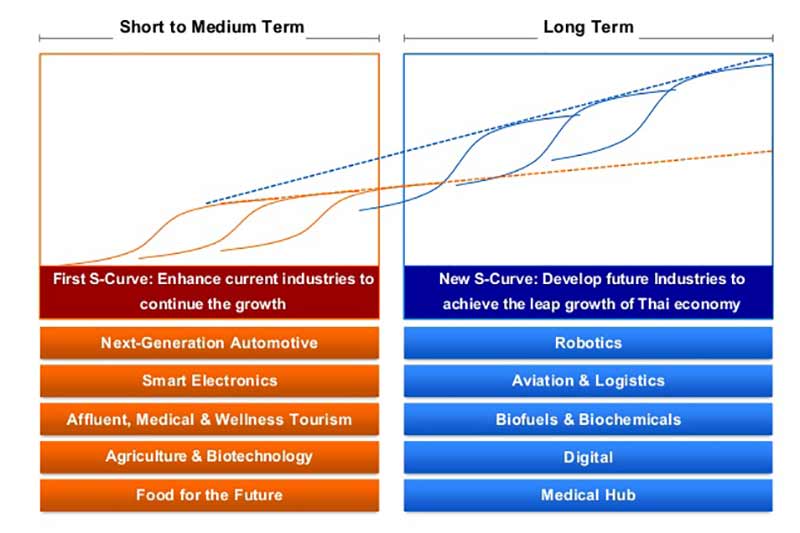
The government of Thailand is taking a number of measures to shift the country from a production-based to a service-based economy, moving from producing commodities to innovative products, emphasising on promoting technology, creativity, and innovation in the industries under focus. Moving to Thailand 4.0 could help the country escape the middle-income trap and growing disparities.
Last month, the National Competitive Enhancement Act for Targeted Industries (the Act) was published in the Royal Gazette.
National Competitive Enhancement Act for Targeted Industries
According to reports (here and here) the incentives under the Act can be classified into three categories. The first one is exemption from corporate income tax for qualifying firms for a maximum period of up to 15 years. The second category of incentives is non-tax benefits that already exist under Thailand’s Investment Promotion Act (IPA), including exemption of import duties for imported machinery, and visas and permits allowing foreign experts and craftsmen to work in the country. However, tax exemption and deductibles under the IPA are excluded as the Act provides separate provisions for tax waiver.
A third type of incentive is provided through subsidies from the Fund for Enhancement of Competitiveness for Targeted Industries, newly created by the Act, which has a seed money of THB10 billion (~USD 286 million) for investment in research and development or innovation and development of expertise for targeted industries.
A Board of Investment (BOI) document lists the 10 targeted industries under Thailand 4.0. They can be divided into two segments: 1) First S-curve or five existing industrial sectors (which can be developed by adding value through advanced technologies (Next-Generation Automotive, Smart Electronics, High-Income Tourism and Medical Tourism, Efficient Agriculture and Biotechnology and Food Innovation) and 2) New S-curve or five sectors which can serve as growth engines to accelerate Thailand’s future growth (Automation and Robotics, Aerospace, Bio-Energy and Bio-chemicals, Digital and Medical and Healthcare).
The BOI, which is the principal government agency for encouraging investment, has been focusing on attracting foreign investment, particularly in the high-tech sector. The total new investment value under the BOI stood at THB 144 billion (USD 4.05 billion) up to August 2016 in the 10 targeted industries under Thailand 4.0, accounting for 48% of total investment.
Five-pronged policy approach
During the past two years, a number of laws have been amended and drafted to improve the ease of doing business by eliminating hurdles and improving the public sector’s services.
Recently, the Prime Minister, Prayut Chan-o-cha, presented a five-pronged policy approach to attract investments from the private sector: 1) Technology: To enhance capacity in core technologies where Thailand has potential, such as biotechnology, and agricultural, food, energy, and health-related and medical technologies; 2) Human resource development: To promote "Thais 4.0” and attract talent from overseas; 3) Infrastructure: To develop physical infrastructure, connectivity infrastructure, intellectual infrastructure, and social infrastructure; 4) Enterprises: To empower entrepreneurs and enterprises of all levels, promote startups, uplift SMEs from the original equipment manufacturer (OEM) to the original design manufacturer (ODM) and the original brand manufacturer (OBM), and encourage large-scale corporations to help develop local suppliers; and 5) Targeted industries: To promote investment in the 10 S-curve and new S-curve industries, especially in the Eastern Economic Corridor (EEC).
The government is trying to facilitate investment in the EEE in the Rayong, Chon Buri, and Chachoengsao provinces, through expedited development of public utilities, transport infrastructure, human resources, and the One Stop Service.
The government is also aiming for geographically distributed development through its "18 provincial clusters and 76 provinces” mechanism. Economic connectivity is being promoted for special economic development zones in 10 provinces adjacent to the neighboring countries. Local industry value chains are linked together by a cluster approach.
The Bangkok Post reported that Deputy Prime Minister, Somkid Jatusripitak, has called on the stock market to attract more listings from the 10 strategic industries, saying that 30% of the market capitalisation of newly listed companies in 2017 should come from companies in those industries.
Featured image: Thailand Board of Investment North America
















